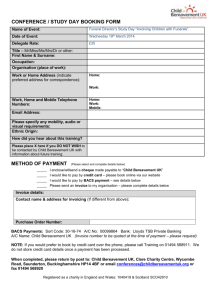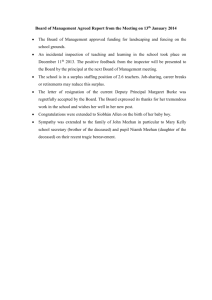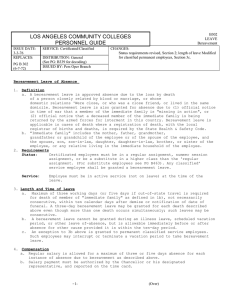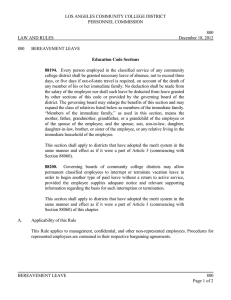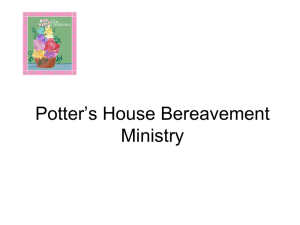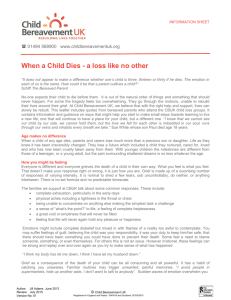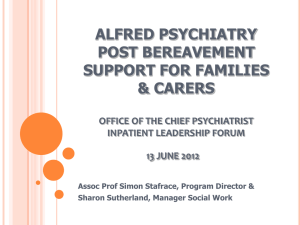Bereavement Policy 2014
advertisement
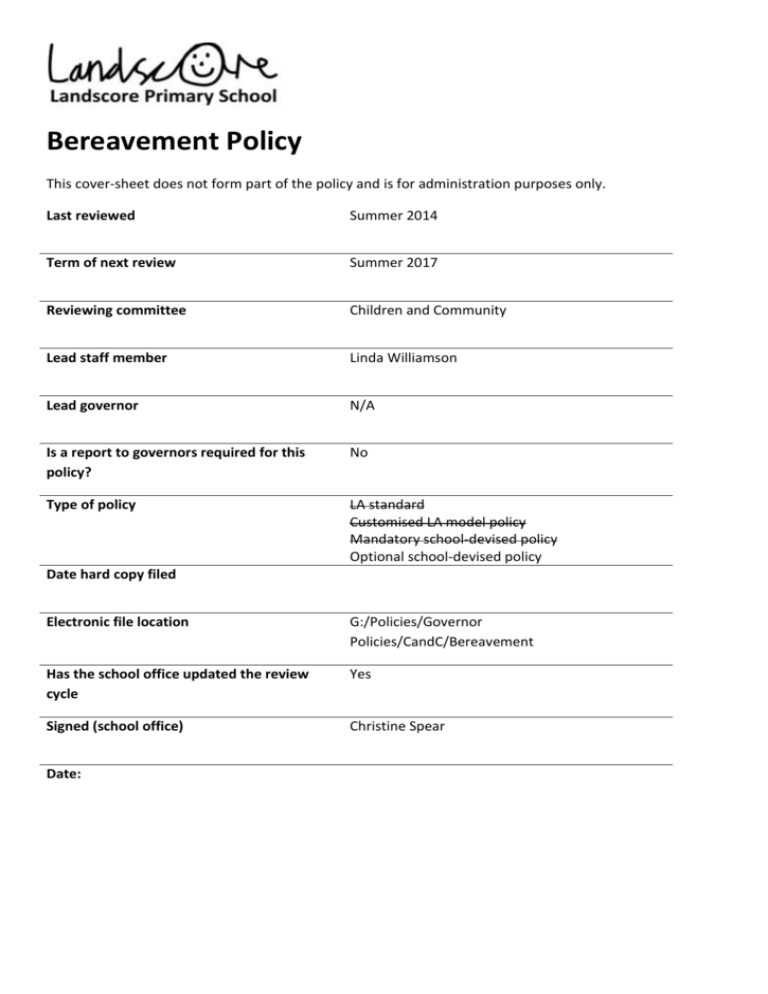
Bereavement Policy This cover-sheet does not form part of the policy and is for administration purposes only. Last reviewed Summer 2014 Term of next review Summer 2017 Reviewing committee Children and Community Lead staff member Linda Williamson Lead governor N/A Is a report to governors required for this policy? No Type of policy LA standard Customised LA model policy Mandatory school-devised policy Optional school-devised policy Date hard copy filed Electronic file location G:/Policies/Governor Policies/CandC/Bereavement Has the school office updated the review cycle Yes Signed (school office) Christine Spear Date: Bereavement Policy A death within the school environment can cause an unbalanced feeling within the school as a whole. The school would need to show that they are still a strong “family” bringing people together in their grief. This policy relates to the death of a staff member, a child within the school or a death of a parent of a child in the school. The aim of this policy is to provide a framework for all staff, both teaching and non teaching, to deal with bereavement in a sensitive and compassionate manner. Clear and accurate information will be given, in age-appropriate language. The spiritual and religious beliefs about death will be respected. 1. Pupil or Staff Bereavement: In the event of the death of a member of staff or child attending the school the following actions will be considered: All staff will be informed and there will be consultation with the family of the deceased, over decisions taken. The consultation will consider the best way to inform the pupils and the school community and for the internal mechanisms for support to be organised and deployed. A decision will be made in agreement with the family, about attendance at the funeral and any memorial service. The Local Authority and other agencies will be informed and involved as appropriate regarding counselling and whether the school should be closed at the time of the funeral or memorial service. If appropriate, a press statement will be prepared and a strategy for dealing with the media agreed with the family. 2. Anticipated Grief: We acknowledge that there may be instances in school where bereavement is preceded by a period of anticipated grief, for example in the case of terminal illness. We will try throughout this time to offer support to both the family and child. 3. Curriculum: Whilst ensuring that we are able to support children in the event of bereavement we also acknowledge the need to address it as part of our ongoing work in school in order to prepare children in some small way for inevitability of life. This is done through PSHE, stories, assemblies and RE. 4. Family Bereavement: In the event that a child in school suffers the bereavement of a close family member, we will try to support the child and family. We will try to work in partnership with parents and guardians when considering how best to support the child. Page 1 of 4 5. Fears and Anxieties: Children will often feel frightened following a death. They may think that a surviving parent may die or that they may die. We will try to reassure them whilst remaining truthful. 6. Blame: It may be necessary to reassure younger children that they are not to blame. 7. Monitoring behaviour: We will monitor behaviour and be mindful of changes. 8. Validation of individual’s feelings: We will accept that there are individual differences in feelings and expressions of feelings. We will let the children know that they can talk about death. Sometimes children will want to pretend that the death has not happened. It is important to respect this need as well as providing an environment that encourages sharing emotions. Sometimes children will feel angry, worried or withdrawn. We will try to balance the child’s needs for consistency and clear boundaries with an acceptance that they may temporarily be unable to conform. 9. Involvement and Inclusion: We acknowledge the need to involve children in commemorating a death. Whilst taking into account the wishes of the family we will look for ways for the children to remember loved ones. We will try to bear in mind that significant events like birthdays and Christmas may trigger feelings and further opportunities may need to be given to explore feelings. 10. Continued Routine Activities: In school we will try as far as possible to continue with established routines in order to give the child as much stability and continuity as we can. 11. Resources: At school the following books and leaflets are available: Michael Rosen’s Sad Book, Michael Rosen Badger’s Parting Gift, Susan Varley Goodbye Mog, Judith Kerr When People Die, Sarah Levete I miss you: A first Look at Death, Pat Thomas King of Shadows, Susan Cooper Outside Agencies and Links: www.winstonswish.org.uk www.crusebereavmentcare.org.uk www.childbereavement.org.uk www.balloons-devon.org.uk Page 2 of 4 Landscore's Quick Reference Guide Following a Death at School Responsibilities of Headteacher and/or assistant heads Arrange an assembly to inform pupils of the situation. Arrange for Bereavement Activities in class with class teachers. Inform all staff of the situation. Inform the L.A. and Educational Pysychology Dept. of the situation. Contact and arrange to see family of deceased at home or school to decide what level of support is needed. Inform parents.* See enclosed sample letter. Nominate the members of staff who will offer ongoing pastoral support for pupils, staff and parents. Offer support to pupils/staff as necessary e.g. counselling. Send cards or letters of condolence to the family of the deceased. Make a note of the date in register/records for future reference. Organise memorial at school in accordance with pupil/family wishes e.g. memory book, pebbles, candles, tree planting. Keep in regular contact with the family concerning funeral/memorial service arrangements. Contact/prepare for media announcement. Page 3 of 4 Sample letter to parents: Dear Parents, The school has experienced the sudden death/received news of the death of…………………….. (Name of student/teacher.) We are deeply saddened by the deaths/events. …..Brief details of the death and positive remembrances of the person lost……. Our thoughts are with the …………………………..(Family name). It is possible that your child may have feelings and questions he/she may like to discuss with you. You can help your child by taking time to listen and by encouraging them to express their feelings in different ways. It is not uncommon for children to have difficulty concentrating or to be fearful, anxious, or irritable. They may become withdrawn, cry, complain of physical aches and pains, have difficulty sleeping or have nightmares. Some may not want to eat. Over the course of the days to come, please keep an eye on your child and allow him/her to express their feelings without criticism. Although school will continue as usual, I anticipate that the next few days will be difficult for everyone. Please do not hesitate to contact us if you feel you need some support. Yours sincerely Sample media announcement (TO BESHARED WITH LA MEDIA DEPARTMENT BEFORE CIRCULATION): My name is …………………………. I am Headteacher/assistant head at Landscore Primary School. We learned today of the death of one of our pupils/members of staff. This is a terrible tragedy for the …..family, our school and our community. We are deeply saddened by these events. Our sympathy and thoughts are with family and friends. ………A brief description about the deceased with positive remembrance………. We have been in contact with the family and they have requested that we understand their need for privacy at this difficult time. The Local Authority and Educational Psychology department have been notified; and members of staff are helping pupils to deal with this tragic event. The school is open to parents to offer support and guidance. We would ask you to respect our privacy at this time. Page 4 of 4

